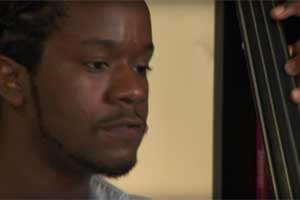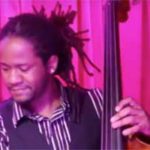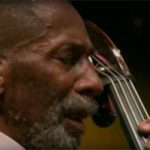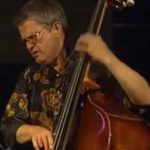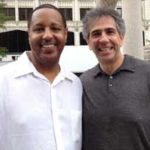DC hotshot talks about studying at Juilliard, winning the Thelonious Monk bass player competition and his brand new CD!
Exclusive interview with FBPO’s Jon Liebman
July 4, 2011
A native of Washington, DC, Ben Williams grew up in an artistic family of musicians, visual artists and rappers. Showing great promise on both bass and piano at an early age, Ben became a star student at the Duke Ellington High School of the Arts, where he performed in the jazz band, gospel choir and orchestra, as well as in extracurricular gigs.
After graduating with honors, Ben received scholarships and distinctions from the Fish Middleton Scholarship Competition, International Society of Bassists, Steans Music Institute, Duke Ellington Jazz Society, International Association of Jazz Educators and other notable organizations. In 2009, Ben was the winner of the Thelonious Monk Institute International Jazz Competition, a prestigious and important award that has launched many successful music careers.
Williams received a Bachelors of Music degree in music education from Michigan State University in 2007 and a Master of Music degree from the Julliard School in 2009. Throughout the course of his brilliant career, Ben has performed with Wynton Marsalis, Herbie Hancock, Pat Metheny, Terence Blanchard, Christian McBride, Nicholas Payton, Paquito D’Rivera, Cyrus Chestnut, Benny Golson, George Duke, Eric Reed, Dee Dee Bridgewater, Roy Hargrove, Mulgrew Miller and many others. He has also recorded and performed regularly as a member of bands led by saxophonist Marcus Strickland, pianist Jacky Terrasson and vibraphonist Stefon Harris.
Ben has led his own groups at Dizzy’s Club Coca-Cola, Harlem Stage, the Rubin Museum of Art and the Tribeca and Saratoga Performing Arts Centers. His debut CD as a leader, State of Art, was released by Concord Jazz in June 2011.
FBPO: How would you describe your musical upbringing?
BW: I believe that a musician’s training begins long before they pick up their instrument. I come from a very multi-talented family of singers, emcees, dancers, instrumentalists, etc., and all are very much into music. As far back as I can remember, there was always music being played in the house. I listened to a lot of my mother’s records, which included James Brown, Motown, all kinds of soul/R&B of the ’60s and ’70s, in addition to the music that was popular at the time, like Michael Jackson, Prince, hip-hop and R&B. Growing up in DC, I played a lot of jazz, R&B/soul, orchestra and gospel gigs.
FBPO: How did you end up choosing the bass as your instrument?
BW: It’s actually a funny story. I was really into Prince as a kid – still am, actually – and wanted to learn to play guitar. When I attended middle school, I had the opportunity to take up an art class of my choice. I mistakenly signed up for “Strings 1,” which was a class for orchestral strings. I wasn’t able to get into the guitar class so I had to pick an instrument. I picked the coolest looking one, the bass. Needless to say, I stayed in that class!
FBPO: Who were your influences when you first discovered the bass?
BW: I was really into Paul Chambers in the beginning, from listening to a lot of Miles records. I really got into Ray Brown, Ron Carter, Sam Jones, Oscar Pettiford, Christian McBride, Robert Hurst, and Mingus shortly after. I was heavily influenced by the great electric bassists Jaco Pastorius, James Jamerson, Willie Weeks, Marcus Miller, Pino Palladino… you know, guys who grooved really hard.
FBPO: On several occasions, I’ve met with Congressman John Conyers at his office in Washington, where he has – for whatever reason! – an upright bass propped up in the corner. I understand you’re familiar with that bass. How so?
BW: Yes I am! My mother worked for Congressman Conyers for many years. When I was kid, I would sometimes accompany my mother to work. I remember going into his office several times and seeing this huge wooden “thing” sitting in the corner and I had no idea what it was. I plucked the strings and just looked at it with intrigue. I find it very ironic that my mother’s boss was not only a jazz fan, but a fan of the bass.
FBPO: Not too many kids show much interest in jazz, especially when they’re really young. Rather, they tend to favor the rock and pop stars of the day, in your case, Prince and Michael Jackson. How did you end up getting bitten by the jazz bug?
BW: I was first bitten by the “jazz bug” when I was in the 7th grade. I was in a youth jazz band led by Fred Foss and during the summer he gave me a tape that had Miles Davis’ classic Kind of Blue on one side and Charles Mingus’ Blues & Roots on the other side. I don’t know if he did this intentionally, but right away, listening to these records showed me the importance of the blues. I was blown away! I’d never felt that way before when listening to music. I felt like a whole new world opened for me, full of excitement and discovery. From that point on, I was hooked.
FBPO: At what point in your education did you realize you were going to pursue a career in music?
BW: I never really thought of playing music as a career decision. I knew it was possible to make a living being a musician, so I made a commitment early on that I was going to give music my all. And, like any profession, if your heart is in it and you put in the work, you will be successful. I can’t pinpoint any particular moment in time that I made that decision, but I always knew I’d be doing this for the rest of my life. Who wouldn’t want to wake up every day and do what they love, and get paid for it?
FBPO: You’ve performed with a list of players that could be considered jazz royalty, among them Wynton Marsalis, Herbie Hancock, Pat Metheny, Terence Blanchard, Benny Golson and so many others. Can you identify a defining moment when your career really started to take off?
BW: It was a definitely an honor to be able to play with all those legends. I have so much respect and admiration for those guys. It felt like luck at first, but luck, as they say, is when preparation meets opportunity. My motto has always been to “stay ready” so you never have to “get ready.” I was fortunate to be able work with those guys at such an early age, but I know for a fact that they are concerned with ensuring that this music (jazz) has a future and the only way to do that is to support the younger generation. Those guys are legends now, but at one point they were the new kids on the block and were given opportunities by their mentors.
FBPO: Congratulations on winning the Thelonious Monk award! What was that experience like – the preparation, the performance, the judges…?
BW: That was one of the most amazing experiences of my life. I can’t say I did anything in particular to prepare for the competition. I would say my entire life up to that point was the preparation. All the years of study, all the countless hours of practice were my preparation for that moment. Whatever I didn’t know by that point, I wasn’t going to learn overnight! In such a pressured situation, I just made sure I was as relaxed as possible.
The semifinal round was especially intense because I was 14th in a line of fifteen bass players. I had to listen to thirteen amazing bassists play before I went up! It was a great hang, nevertheless. The judges were all my heroes and to have them all in one room staring at me I must say was pretty intense also. Winning the competition in my hometown of Washington, DC, made it that much more special.
FBPO: Who were the judges?
BW: Ron Carter, Dave Holland, Charlie Haden, John Patitucci, Christian McBride and Robert Hurst.
FBPO: Yeah, I can see how that could be a little intimidating! Congratulations, once again.
BW: Thanks.
FBPO: Tell me about your experience at Michigan State University. What was it like studying with Rodney Whitaker?
BW: MSU was a wonderful experience. I did a lot of growing up there, as a musician and as a man. It was great to be in a large university like that because I not only got to interact with musicians but also with people studying science, law, journalism, all sorts of things. I was involved in many different groups while I was there. I played in jazz band, orchestra, gospel choir and a funk band all at the same time!
Studying with Rodney was priceless. He was such a great teacher and mentor. He has so much knowledge and really took me under his wing. Rodney helped me become solid in my fundamentals, the basic things you need to be a solid, well-rounded musician. I also took weekly classical lessons with Jack Budrow while studying there. I actually was a Music Ed major, so I spent much of my time learning to become a teacher. MSU actually has one of the top programs in the country for Music Education. That training has proven to be very valuable in teaching situations.
FBPO: How about Juilliard? That’s considered by many to be the “gold standard” of music education.
BW: Juilliard was also an amazing experience. There’s a reason they have such a prestigious reputation. They hold their students to a high standard and expect them to grow and excel. I got a chance to study with the great bassist, Ben Wolfe, as well as many other world-class musicians. Juilliard provides nothing but the best for their students in terms of instruction, facilities and resources. It was a true honor to be a part of that program.
FBPO: Tell me about your brand new CD, State of Art.
BW: I’m very excited about this project. Aside from being my first project, I am excited for the opportunity to share my musical vision with the world. Bassists primarily spend their careers supporting others and helping other musicians’ visions come to fruition. I feel blessed to be able to put this album together. It is a very eclectic record. You can hear the influences of hip-hop, R&B, go-go and classical music in my upbringing.
Aside from my original compositions, there are arrangements of tunes by some of my favorite artists, like Stevie Wonder, Michael Jackson and Goapele. One can always run the risk of creating an unfocused, scattered album with so many different styles, but I think I did a pretty good job of making it cohesive. The musicians on the album did such a great job. There is a great sense of chemistry, which I love. I hope everyone digs it.
FBPO: What else is keeping you busy these days?
BW: I am currently working with Stefon Harris’ band, Blackout, the Jacky Terrasson trio and the Marcus Strickland quartet. I also did some touring earlier this year with Pat Metheny. I recorded with George Benson for his upcoming album, which I believe will be out later this year. Other than that, I’m just trying to stay in shape, eat right – emphasis on trying – reading, enjoying life and helping others. Music is very time consuming, so I don’t have much free time these days.
FBPO: The success you’ve already achieved is nothing short of remarkable, particularly at such a young age. What else would you like to accomplish in your career?
BW: Well, thank you! I have a lot of ideas for special projects and collaborations in the future, so we’ll see how that turns out. I want to get my band on the road as much as possible in the upcoming years, as well as continue working alongside other great artists. I definitely plan on composing some larger scale works at some point. Simply put, I’d just like to continue to grow as a bassist, composer and whatever else I decide to do.
FBPO: What would you be if you weren’t a bass player?
BW: A guitar player! Or maybe a drummer. Or a DJ. I think I would make a good photographer. Sounds weird, but I’ve always wanted to try bartending.
Ben’s hot new CD, State of Art, is available here![]()
